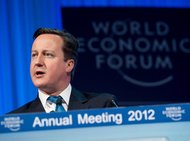Prime Minister David Cameron and his increasingly jittery coalition government have made deficit and debt reduction a defining priority. In December, his powerful chancellor of the Exchequer, George Osborne, warned that an austerity program that had already resulted in the elimination of tens of thousands public-sector jobs would have to be extended for a year longer than planned, to 2018. But that same austerity program has contributed to long-term economic malaise.
On Friday Moody’s became the first ratings agency to strip Britain of its prized triple-A investment grade, reducing the country to Aa1. In its report, Moody’s said one of the core factors behind its decision was the very slow pace of the British recovery.
Mr. Osborne said afterward that Moody’s decision was “disappointing news,” but he promised not to let the downgrade deflect the government from its deficit-cutting strategy.
The challenge Mr. Cameron and Mr. Osborne face in turning around the economy and changing Britain’s status as a fiscal and trade laggard was underscored by two statistics released Friday in a widely anticipated European Commission economic forecast for the European Union.
The first is that despite presiding over one of the longest and highest-profile European austerity campaigns, the British government will end this year with a primary deficit — the purest measure of how much more a government spends than it receives in taxes — of 4.3 percent of gross domestic product. That is by far the highest such figure in Europe and second only to debt-ridden Japan among the world’s developed economies.
The second is that even though the pound has lost up to a third of its value against major currencies since the onset of the financial crisis, Britain this year will be the only developed economy in the world that will register a current account deficit that will be higher, at 3.1 percent of G.D.P., than it was in 2009.
The current account balance is the broadest measure of a country’s ability to sell its goods abroad. The larger the deficit, the more a country must borrow. All things being equal, a less costly currency should make it more attractive for foreigners to purchase a country’s goods or invest in its assets. Export powers like Germany and China run large current account surpluses.
Mr. Cameron has touted the benefits of having a flexible currency, free of the constraints of the euro — and Britain may even hold a referendum on its continued membership in the European Union. But even euro zone countries like Spain, Greece and Portugal, which three years ago had gaping account deficits that drove them to the brink of collapse, have made dramatic improvements in this regard. The European Commission even sees Spain moving to a current account surplus this year.
Britain’s persistent and worsening trade gap illustrates a troubling inability to increase exports even though the government has made this a policy priority. In his first address to Parliament, the incoming governor of the Bank of England, Mark J. Carney, pointed out that since 2000, Britain’s share of global exports had decreased about 50 percent — the steepest decline among the world’s 20 biggest economies.
One explanation for the disappointing British record in narrowing its deficit and becoming more competitive is a surprising decline in productivity since the start of the crisis.
Since their economies tanked, countries like Spain, Portugal and Ireland have become more competitive by laying off workers. That should set the stage for a more robust return to growth once the recession ends.
In Britain, however, the opposite has been true: Despite stagnant economic growth, the British unemployment rate has remained relatively low, at just under 8 percent. In other words, Britain needs more workers to produce the same product — which, in addition to keeping the economy from growing strongly, pushes up labor costs, making exports more expensive to foreign buyers.
Article source: http://www.nytimes.com/2013/02/25/business/global/britains-economic-malaise-brought-ratings-downgrade.html?partner=rss&emc=rss

